The University of Chicago Press, Chicago 60637
The University of Chicago Press, Ltd., London 2010 by The University of Chicago Introduction 1991 by The University of Chicago Sophocles: Oedipus the King
1942 by The University of Chicago All rights reserved. Published 2010
Printed in the United States of America 19 18 17 16 15 14 13 12 11 10 1 2 3 4 5 ISBN-13 : 978-0-226-76868-7 (paper)
ISBN-10: 0-226-76868-6 (paper)
ISBN-13: 978-0-226-76869-4 (e-book) Library of Congress Cataloging-in-Publication Data Sophocles.
[Oedipus Rex. English]
Oedipus the King / Sophocles ; translated and with an introduction by David Grene.
p. cm.
Contains Grenes 1942 translation of Oedipus Rex; also includes Grenes 1991 introduction to Sophocles I, entitled The Theban plays by Sophocles.
ISBN-13 : 978-0-226-76868-7 (pbk. : alk. : alk. paper)
I. paper)
I.
Grene, David. II. Sophocles. Sophocles I. III. IV. IV.
Title: Theban plays by Sophocles.
PA4414.07G74 2010
882.01dc22 2009038278  The paper used in this publication meets the minimum requirements of the American National Standard for Information SciencesPermanence of Paper for Printed Library Materials, ANSI Z39.48-1992.
The paper used in this publication meets the minimum requirements of the American National Standard for Information SciencesPermanence of Paper for Printed Library Materials, ANSI Z39.48-1992.
SOPHOCLES
OEDIPUS THE KING
Translated and with an Introduction by DAVID GRENE THE UNIVERSITY OF CHICAGO PRESS CHICAGO & LONDON INTRODUCTION
The Theban Plays by Sophocles THIS series of plays,
Oedipus the King, Oedipus at Colonus, and
Antigone, was written over a wide interval of years. The dating is only approximate, for reliable evidence is lacking; but the
Antigone was produced in 441 B.C. when Sophocles was probably fifty-four, and
Oedipus the King some fourteen or fifteen years later.
Oedipus at Colonus was apparently produced the year after its authors death at the age of ninety in 405 B.C. Thus, although the three plays are concerned with the same legend, they were not conceived and executed at the same time and with a single purpose, as is the case with Aeschylus
Oresteia.
We can here see how a story teased the imagination of Sophocles until it found its final expression. We can see the degrees of variation in treatment he gave the myth each time he handled it. And perhaps we can come to some notion of what the myths meant to Sophocles as raw material for the theater. The internal dramatic dates of the three plays do not agree with the order of their composition. As far as the legend is concerned, the story runs in sequence: Oedipus the King, Oedipus at Colonus, Antigone. But Sophocles wrote them in the order: Antigone, Oedipus the King, Oedipus at Colonus.
In view of this and the long interval between the composition of the individual plays, we would expect some inconsistencies between the three versions. And there are fairly serious inconsistenciesin facts, for instance. At the conclusion of Oedipus the King, Creon is in undisputed authority after the removal of Oedipus. Though he appeals to him to look after his daughters, Oedipus refrains from asking Creon to do anything for his sons, who, he says, will be all right on their own (OK 1460). It is Creon who will succeed Oedipus in Thebes, and there is no question of any legitimate claim of Oedipus descendants (OK 1418). But in Antigone, Creon tells the chorus that he has favorably observed their loyalty first to Oedipus and then to his sons, and so has hope of their devotion to himself.
In Oedipus at Colonusthe last of the three plays he wroteSophocles makes one of his very few clumsy efforts to patch the discrepancies together. In Oedipus at Colonus (ll. 367 ff), Ismene says that at first the two sons were willing to leave the throne to Creon in view of their fatal family heritage, but after a while they decided to take over the monarchy and the quarrel was only between themselves as to who should succeed. At this point Creon has vanished out of the picture altogether! Again, the responsibility for the decision to expel Oedipus from Thebes and keep him out rests, in Oedipus the King, entirely with Creon, who announces that he will consult Apollo in the matter. In Oedipus at Colonus his sons guilt in condemning their father to exile is one of the bitterest counts in Oedipus indictment of them (OC 1360 ff.). These are important differences.
We do not know anything really certain about the manner of publication of the plays after their production. We know even less about Sophocles treatment of his own scripts. Maybe he simply did not bother to keep them after he saw them as far as the stage, though that seems unlikely. Or it is possible and likelier that Sophocles, as he wrote the last play in extreme old age and in what seems to be the characteristic self-absorption of the last years of his life, cared little about whether Oedipus at Colonus exactly tallied, in its presentation, with the stories he had written thirty-seven and twenty-two years earlier. Let us for the moment disregard the details of the story and concentrate on what would seem to be the central theme of the first two plays in order of composition. And here we find something very curious.
Most critics have felt the significance of the Antigone to lie in the opposition of Creon and Antigone and all that this opposition represents. It is thus a play about something quite different from Oedipus the King. And yet what a remarkable similarity there is in the dilemma of Creon in Antigone and Oedipus himself in the first Oedipus play. In both of them a king has taken a decision which is disobeyed or questioned by his subjects. In both, the ruler misconstrues the role of the rebel and his own as a sovereign. In both, he has a crucial encounter with the priest Teiresias, who warns him that the forces of religion are against him.
In both, he charges that the priest has been suborned. There the resemblance ends; for, after abusing the old prophet, Creon is overcome with fear of his authority and, too late, tries to undo his mistake. In Oedipus the King the king defies all assaults upon his decision until the deadly self-knowledge which starts to work in him has accomplished its course and he is convicted out of his own mouth. Usually, as we know, the Antigone is interpreted entirely as the conflict between Creon and Antigone. It has often been regarded as the classical statement of the struggle between the law of the individual conscience and the central power of the state. Unquestionably, these issues are inherent in the play.
Unquestionably, even, Sophocles would understand the modern way of seeing his play, for the issue of the opposition of the individual and the state was sufficiently present to his mind to make this significant for him. But can the parallelism between the position of Oedipus in the one play and Creon in the other be quite irrelevant to the interpretation of the two? And is it not very striking that such a large share of the Antigone should be devoted to the conclusion of the conflict, as far as Creon is concerned, and to the destruction of his human happiness? What I would suggest is this: that Sophocles had at the time of writing the first play (in 442 B.C.) a theme in mind which centered in the Theban trilogy. One might express it by saying that it is the story of a ruler who makes a mistaken decision, though in good faith, and who then finds himself opposed in a fashion which he misunderstands and which induces him to persist in his mistake. This story is later on going to be that of a man who breaks divine law without realizing that he is doing so, and whose destruction is then brought about by the voice of the divine law in society. Between the Antigone and
Next page
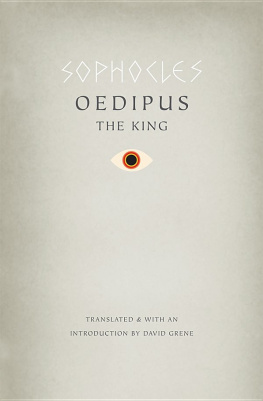
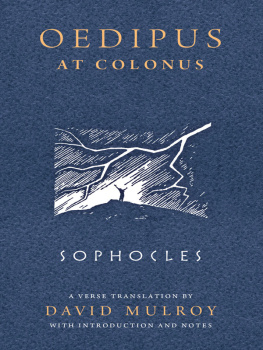
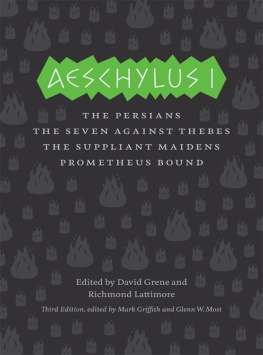
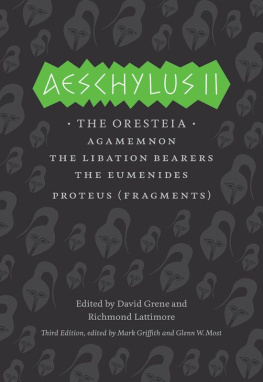

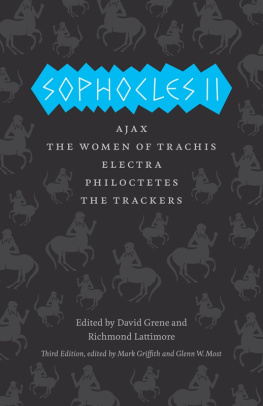
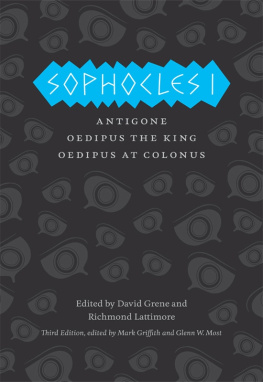
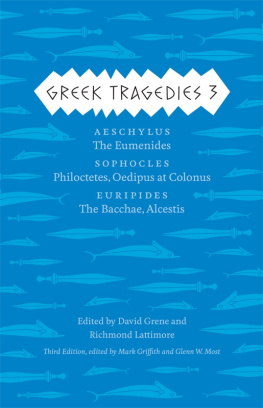
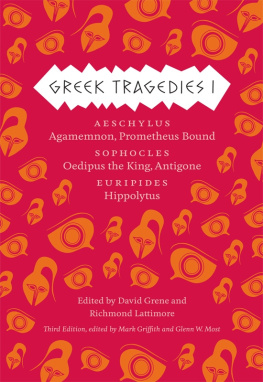
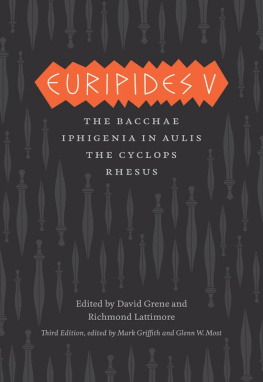
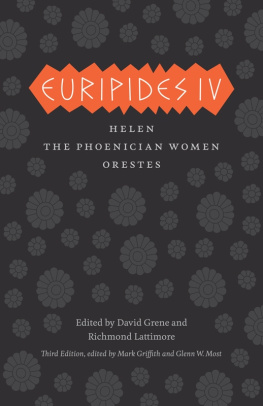
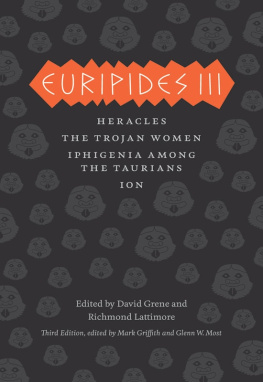
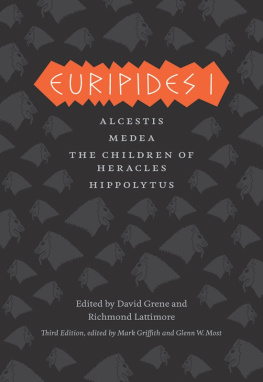
 The paper used in this publication meets the minimum requirements of the American National Standard for Information SciencesPermanence of Paper for Printed Library Materials, ANSI Z39.48-1992.
The paper used in this publication meets the minimum requirements of the American National Standard for Information SciencesPermanence of Paper for Printed Library Materials, ANSI Z39.48-1992.